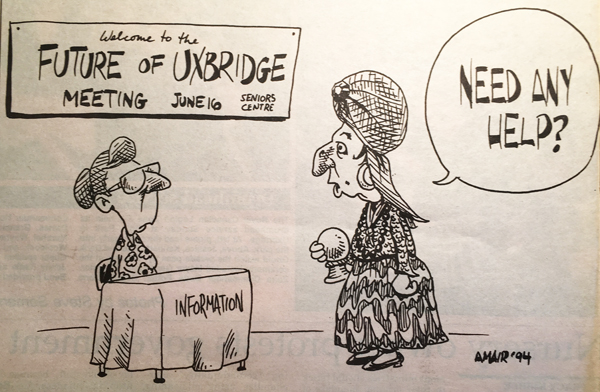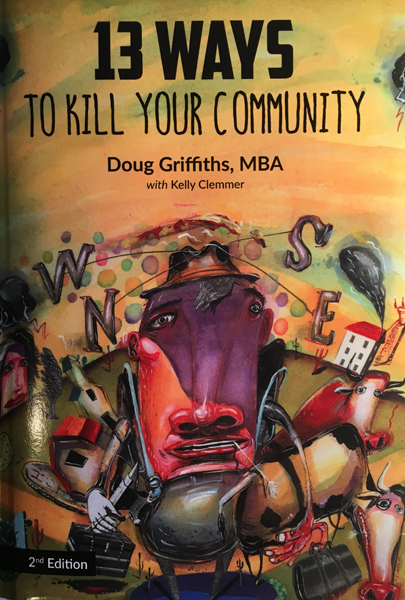 There’s a cartoon I have saved in one of my filing cabinets. It goes back almost 25 years now. It depicts a person sitting at a table receiving members of the public at a local meeting – not a township council meeting – a kind of town hall meeting. There’s a sign above the receptionist’s head.
There’s a cartoon I have saved in one of my filing cabinets. It goes back almost 25 years now. It depicts a person sitting at a table receiving members of the public at a local meeting – not a township council meeting – a kind of town hall meeting. There’s a sign above the receptionist’s head.
“Welcome to the Future of Uxbridge,” the sign says.
Meanwhile approaching the receptionist is a woman wearing a bandana and carrying a crystal ball. She looks very much like a fortune teller and asks simply, “Need any help?”
My then publisher and editor, Andrew Mair, at the then Uxbridge Tribune newspaper was the creator of the cartoon. It was the spring of 1994. Back then, the township faced a number of challenges – the potential of explosive development, the shift of business and commerce from main-street storefronts to big-box stores on the extremities, encroachment on the Oak Ridges moraine, the flight of young people from the community and public apathy – to name a few.
As a relative newcomer and newly resident columnist in town, I was asked to moderate a town hall on “The Future of Uxbridge.” I agreed and it was held at the Seniors’ Centre on June 16 that year. While we didn’t attract any clairvoyants, we did attract a lot of criticism, indeed, from some of our elected representatives.
“It is a matter of public record that this council is proceeding with a strategic plan,” one municipal official said in response to the proposed town hall. “We will not be rushed into this challenging and time-consuming process.”
 Well, time continues to conspire against us. And issues continue to fester. Some of the same challenges we faced in 1994, still loom large a quarter of a century later. That’s why the Cosmos has chosen to bring Doug Griffiths to Trinity United Church to speak on Wednesday, May 23. Griffiths, while schooled in arts, philosophy and education, and experienced in elected office (he’s the former minister of municipal affairs for the province of Alberta), has more recently worked as what he calls “a community therapist.”
Well, time continues to conspire against us. And issues continue to fester. Some of the same challenges we faced in 1994, still loom large a quarter of a century later. That’s why the Cosmos has chosen to bring Doug Griffiths to Trinity United Church to speak on Wednesday, May 23. Griffiths, while schooled in arts, philosophy and education, and experienced in elected office (he’s the former minister of municipal affairs for the province of Alberta), has more recently worked as what he calls “a community therapist.”
For much of the past year, the Cosmos has featured excerpts from his book, 13 Ways To Kill Your Community, leading up to his appearance later this month. As negative as his book sounds, what’s clear is Griffiths’ passion to help small-town Canada prosper and survive.
In our continuing series in the paper, Griffiths has presented readers with ways that a community misreads its strengths and weaknesses. He has shown us the numbers about shopping locally. His analysis of abandoning those under the age of 35 and those over the age of 65 has made us all reflect on our personal legacies and our town’s. Griffiths has poked us about beautifying, not abandoning our main streets. And he has helped us reflect on preserving the natural elements as well as the commercial ones that preserve prosperity.
And ultimately he has accused us all of falling back on the “welcoming little lie,” that makes us look inward, not outward.
“The most effective way to create failure is to find someone else to blame for what is wrong in your community,” Griffith writes. “Blame a teacher, preacher, doctor, farmer, politician or business leader. If you want to kill your community, blame others, and you can feel guilt-free as you watch your community take its last breath.”
It’s no coincidence the Cosmos has timed Griffiths’ provocative positions on the future of community in the lead-up to this year’s municipal election. Among Griffiths’ key recommendations is for greater citizen involvement in community decision-making. For some, that means volunteering; for others, it may mean standing for public office. In any case, to use Griffiths’ reverse psychology: “If you want to kill your community, you must become complacent.”
Twenty-five years ago this spring when I moderated the town hall on “The Future of Uxbridge,” at the Seniors’ Centre I was nearly pilloried for doing so. Some on Township Council criticized me for attempting to usurp its powers. I was accused of being the shill for a new mayoral candidate in the then forthcoming municipal election. The town seemed to be in a flap about the idea of vox populi, the voice of the people, discussing issues affecting them out in the open. It seemed more comfortable to let sleeping dogs lie.
Well, a quarter century ago, we didn’t go to hell in a handbasket, the way some suggested we might. But somewhere between that hellish hand-basket and that fortune teller in the newspaper cartoon back then lies the need for candid self-analysis, self-criticism and self-determination. Only a combination of greater awareness of the issues, higher turnout at the ballot box this fall, and a more-involved citizenry can prevent death by 13 or more shortcomings.
“We can’t often prevent the challenges from arising,” Griffiths writes, “but we can choose how we respond to them.”
So, mark down 7 p.m., Wednesday, May 23, at the Trinity United on your calendar. I’ll see you there.